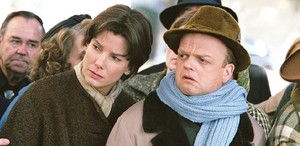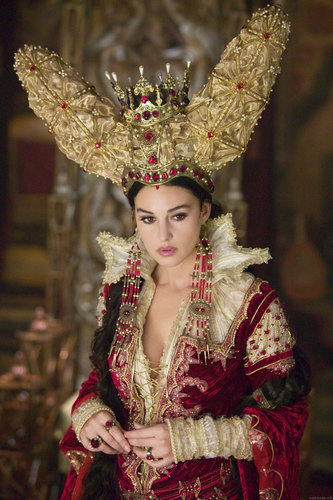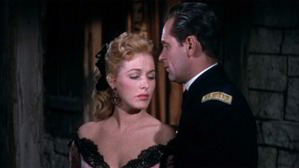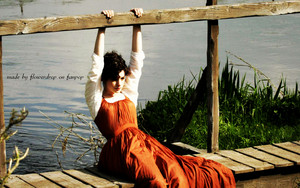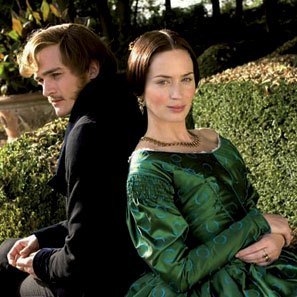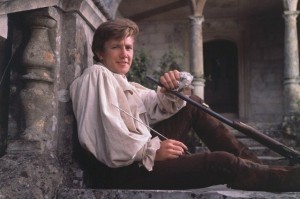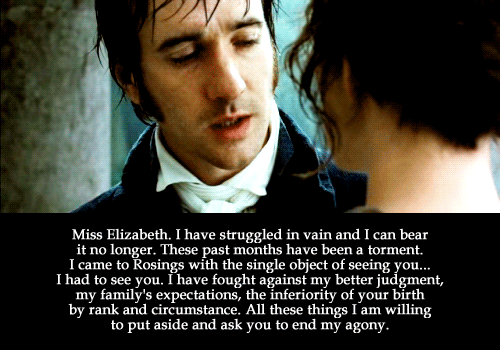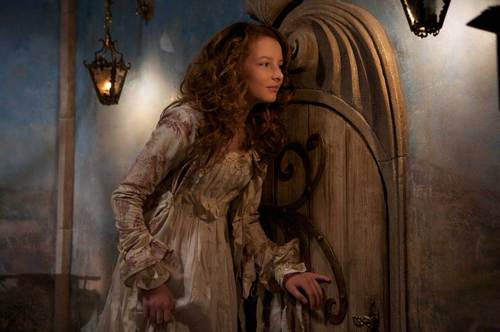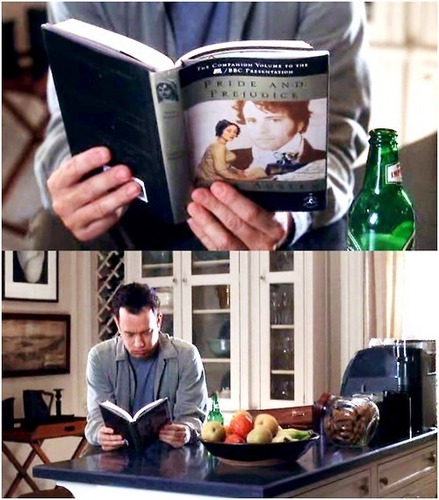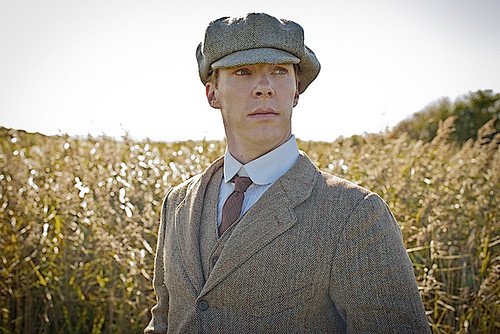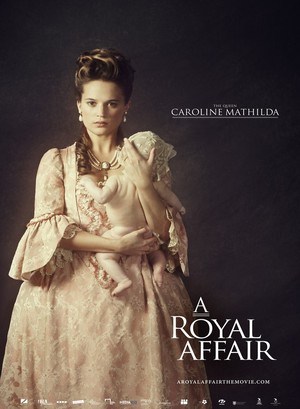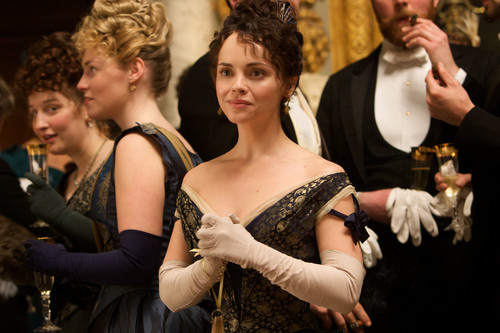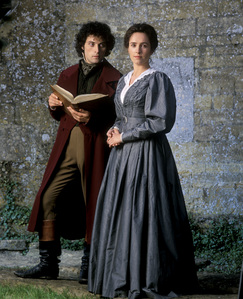"INFAMOUS" (2006) Review
I have heard a lot about the two movie biographies based upon Truman Capote’s experiences, while working on his famous 1966 non-fiction novel, "In Cold Blood" – 2005's "CAPOTE" and "INFAMOUS", which hit movie theaters in the following year. But this review is about the second film . . . namely "INFAMOUS". Written and directed by Douglas McGrath, the movie starred Toby Jones as Truman Capote.
To be honest, I did not know what to expect of "INFAMOUS". Since it was the second Capote movie to be released, it failed to garner any prestigious critic awards or nominations – aside from a Independent Spirit Best Supporting Actor nod for Daniel Craig, who played one of the Clutters' murderers, Perry Smith. After watching the movie, I found myself wondering why lead actor Toby Jones had failed to earn his own nomination. The man’s complex portrayal of Capote seemed all at once witty, sharp, manipulative, vulnerable and rather sad. In all, it was a brilliant performance. He seemed to revel in Capote’s legendary flamboyant wit and charm in all its glory. One of Jones’ funniest scenes involved Capote’s snappy repartees to prison inmates shouting lewd propositions at him, during his first visit to the prison where Smith and Dick Hickock were incarcerated. Yet at the same time, Jones also revealed the author’s talent for cold-blooded deception and manipulation, which he used to gain the trust of his New York friends, along with the citizens of Holcomb and the two killers, whose anecdotes he needed to complete his book. This talent for drawing out secrets . . . and disclosing them not only attracted the suspicion of Perry Smith, but also got Capote in hot water with his "swans" in the mid-1970s, thanks to an unpublished manuscript of his book, "Answered Prayers". A few chapters managed to end up in the New York magazine, "Esquire". But what is more interesting about Jones’ performance in the movie is that his experiences in Kansas ended up peeling away Capote’s flamboyant façade, forcing him to face the pain and sorrow created by an unhappy childhood.
Ironically, it was Capote’s encounters with convicted murderer, Perry Smith, which forced the author to face his personal demons. What can I say about Daniel Craig’s performance? Other than the British actor not only deserved his Independent Spirit Award nomination, but like Jones, he also deserved both a Golden Globe and Academy Award nomination. His Perry Smith was a brooding, quiet man who projected vulnerability, intelligence and brutal menace. It was easy to see how Capote and Smith had developed a close relationship. Both shared a taste for intellectual and artistic pursuits that allowed them to hide from unhappy childhoods that included suicidal mothers. Both actors created a dynamic screen chemistry through two contrasting personalities that seemed to share similar childhood experiences. Craig brilliantly projected Smith’s varying personalities in two scenes – one in which he expressed polite distaste at Capote’s gift of pornographic magazines; and in another, his terrifying anger at the "In Cold Blood" title, which led to a threat of rape of the author.
"INFAMOUS" could boast a first-class supporting cast led by Sandra Bullock, who portrayed Capote’s close friend and fellow author, Harper Lee ("To Kill a Mockingbird"). Many critics seemed surprised by Bullock’s excellent portrayal of the warm and wryly amused Alabama author. Apparently, they must have been deluded by some belief that Bullock was only capable of light comedy. But the future Oscar winner was given a chance to showcase her dramatic chops in one "documentary" interview scene in which she expressed Lee’s bitter anger at the public’s demand for an endless supply of entertainment by talented artists. I also enjoyed Jeff Daniels' wry and sardonic portrayal of the Kansas Bureau Investigations officer in charge of the Clutter case, whose family eventually befriended Capote. His performance was highlighted in a favorite scene of mine that featured the development of Capote and Dewey’s friendship over an arm wrestling match.
Lee Pace portrayed Dick Hickock, Smith’s partner and the alleged brains behind the attempt to rob the Clutters. I found his performance rather humorous and gregarious, yet there were times it threatened to be a touch frantic. Since "INFAMOUS" gave the audience a wide glimpse into Capote’s New York lifestyle, the movie also included his circle of "swans", with whom he developed a close relationship until his disclosure of their secrets in the mid-70s. Those "swans" included Babe Paley (Sigourney Weaver) – the wife of CBS baron Bill Paley; Diana Vreeland (Juliet Stevenson), the fashion magazine editor; Slim Keith (Hope Davis), the woman who was married to Howard Hawks and Leland Hayward; and Marella Agnelli (Isabella Rossellini), Italian-American princess who became a furniture designer and tastemaker. Also included in that group were publisher Bennett Cerf (Peter Bogdanovich), novelist and Capote’s rival Gore Vidal (Michael Panes). I was especially amused by Stevenson’s humorous portrayal of the vivacious Vreeland, who seemed proud of her own eccentric nature and appreciative of Capote’s attitude toward it.
Some reviews have criticized McGrath's tendency to switch the movie’s setting between Capote’s glittering New York world and the somber atmosphere of Holcomb, Kansas. I understood why he did it. Both settings seemed like metaphors for the writer’s contrasting psyche during those six years he worked on "In Cold Blood". It started out with a glittering night with Capote and Babe Paley at the El Morocco nightclub (with Gwenyth Paltrow singing a sultry rendition of "What Is This Thing Called Love") and ended with Capote unable to keep the dark memories of Kansas out of his mind. In fact, once Capote had finally set eyes upon Smith, Holcomb's bleak setting slowly threatened to puncture the frivolous façade he had created, whenever he was in New York. The emotional cost from the book and his relationship with Smith resulted in his inability to write his next book – "Answered Prayers", as shown in the movie’s final scene.
The only problems I had with "INFAMOUS" were "documentary" interviews shown during the movie’s first half-hour. Frankly, I believe that the movie could have started out with these interviews, before segueing into the story. And aside from Capote’s tour of the Clutters’ home, I found the sequence featuring his interviews with some of Holcomb’s citizens a little dull and hard to watch. Fortunately, the arrival of Smith and Hickcock ended the dull sequence and from there, my interest in the movie remained constant until the end.
Whether one is a fan of the Philip Seymour Hoffman/Bennett Miller film, "CAPOTE", I would recommend "INFAMOUS" . . . or at least give it a chance. In its own way, it is just as fascinating as the 2005 Oscar-winning film.
I have heard a lot about the two movie biographies based upon Truman Capote’s experiences, while working on his famous 1966 non-fiction novel, "In Cold Blood" – 2005's "CAPOTE" and "INFAMOUS", which hit movie theaters in the following year. But this review is about the second film . . . namely "INFAMOUS". Written and directed by Douglas McGrath, the movie starred Toby Jones as Truman Capote.
To be honest, I did not know what to expect of "INFAMOUS". Since it was the second Capote movie to be released, it failed to garner any prestigious critic awards or nominations – aside from a Independent Spirit Best Supporting Actor nod for Daniel Craig, who played one of the Clutters' murderers, Perry Smith. After watching the movie, I found myself wondering why lead actor Toby Jones had failed to earn his own nomination. The man’s complex portrayal of Capote seemed all at once witty, sharp, manipulative, vulnerable and rather sad. In all, it was a brilliant performance. He seemed to revel in Capote’s legendary flamboyant wit and charm in all its glory. One of Jones’ funniest scenes involved Capote’s snappy repartees to prison inmates shouting lewd propositions at him, during his first visit to the prison where Smith and Dick Hickock were incarcerated. Yet at the same time, Jones also revealed the author’s talent for cold-blooded deception and manipulation, which he used to gain the trust of his New York friends, along with the citizens of Holcomb and the two killers, whose anecdotes he needed to complete his book. This talent for drawing out secrets . . . and disclosing them not only attracted the suspicion of Perry Smith, but also got Capote in hot water with his "swans" in the mid-1970s, thanks to an unpublished manuscript of his book, "Answered Prayers". A few chapters managed to end up in the New York magazine, "Esquire". But what is more interesting about Jones’ performance in the movie is that his experiences in Kansas ended up peeling away Capote’s flamboyant façade, forcing him to face the pain and sorrow created by an unhappy childhood.
Ironically, it was Capote’s encounters with convicted murderer, Perry Smith, which forced the author to face his personal demons. What can I say about Daniel Craig’s performance? Other than the British actor not only deserved his Independent Spirit Award nomination, but like Jones, he also deserved both a Golden Globe and Academy Award nomination. His Perry Smith was a brooding, quiet man who projected vulnerability, intelligence and brutal menace. It was easy to see how Capote and Smith had developed a close relationship. Both shared a taste for intellectual and artistic pursuits that allowed them to hide from unhappy childhoods that included suicidal mothers. Both actors created a dynamic screen chemistry through two contrasting personalities that seemed to share similar childhood experiences. Craig brilliantly projected Smith’s varying personalities in two scenes – one in which he expressed polite distaste at Capote’s gift of pornographic magazines; and in another, his terrifying anger at the "In Cold Blood" title, which led to a threat of rape of the author.
"INFAMOUS" could boast a first-class supporting cast led by Sandra Bullock, who portrayed Capote’s close friend and fellow author, Harper Lee ("To Kill a Mockingbird"). Many critics seemed surprised by Bullock’s excellent portrayal of the warm and wryly amused Alabama author. Apparently, they must have been deluded by some belief that Bullock was only capable of light comedy. But the future Oscar winner was given a chance to showcase her dramatic chops in one "documentary" interview scene in which she expressed Lee’s bitter anger at the public’s demand for an endless supply of entertainment by talented artists. I also enjoyed Jeff Daniels' wry and sardonic portrayal of the Kansas Bureau Investigations officer in charge of the Clutter case, whose family eventually befriended Capote. His performance was highlighted in a favorite scene of mine that featured the development of Capote and Dewey’s friendship over an arm wrestling match.
Lee Pace portrayed Dick Hickock, Smith’s partner and the alleged brains behind the attempt to rob the Clutters. I found his performance rather humorous and gregarious, yet there were times it threatened to be a touch frantic. Since "INFAMOUS" gave the audience a wide glimpse into Capote’s New York lifestyle, the movie also included his circle of "swans", with whom he developed a close relationship until his disclosure of their secrets in the mid-70s. Those "swans" included Babe Paley (Sigourney Weaver) – the wife of CBS baron Bill Paley; Diana Vreeland (Juliet Stevenson), the fashion magazine editor; Slim Keith (Hope Davis), the woman who was married to Howard Hawks and Leland Hayward; and Marella Agnelli (Isabella Rossellini), Italian-American princess who became a furniture designer and tastemaker. Also included in that group were publisher Bennett Cerf (Peter Bogdanovich), novelist and Capote’s rival Gore Vidal (Michael Panes). I was especially amused by Stevenson’s humorous portrayal of the vivacious Vreeland, who seemed proud of her own eccentric nature and appreciative of Capote’s attitude toward it.
Some reviews have criticized McGrath's tendency to switch the movie’s setting between Capote’s glittering New York world and the somber atmosphere of Holcomb, Kansas. I understood why he did it. Both settings seemed like metaphors for the writer’s contrasting psyche during those six years he worked on "In Cold Blood". It started out with a glittering night with Capote and Babe Paley at the El Morocco nightclub (with Gwenyth Paltrow singing a sultry rendition of "What Is This Thing Called Love") and ended with Capote unable to keep the dark memories of Kansas out of his mind. In fact, once Capote had finally set eyes upon Smith, Holcomb's bleak setting slowly threatened to puncture the frivolous façade he had created, whenever he was in New York. The emotional cost from the book and his relationship with Smith resulted in his inability to write his next book – "Answered Prayers", as shown in the movie’s final scene.
The only problems I had with "INFAMOUS" were "documentary" interviews shown during the movie’s first half-hour. Frankly, I believe that the movie could have started out with these interviews, before segueing into the story. And aside from Capote’s tour of the Clutters’ home, I found the sequence featuring his interviews with some of Holcomb’s citizens a little dull and hard to watch. Fortunately, the arrival of Smith and Hickcock ended the dull sequence and from there, my interest in the movie remained constant until the end.
Whether one is a fan of the Philip Seymour Hoffman/Bennett Miller film, "CAPOTE", I would recommend "INFAMOUS" . . . or at least give it a chance. In its own way, it is just as fascinating as the 2005 Oscar-winning film.


